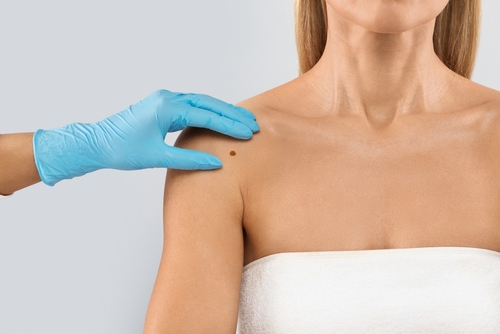Month Spotlights Mental Health, Women's Health and Much More
Mental HealthPosted:

Information is power, it’s often said. That’s why health observances are important for raising awareness about health-related topics. They serve as opportunities to educate our communities, promote healthy behaviors, and highlight important health issues.
Empower yourself by exploring these health observances and making your voice heard about health issues that matter to all of us. For a complete list of health observances, visit NIAMS (National Institute of Arthritis and Musculoskeletal and Skin Diseases) and health.gov.
Mental Health Awareness Month addresses the challenges faced by millions of Americans living with mental health conditions. The recognition helps raise awareness, combats the stigma around mental health conditions, advocates for more mental health resources, and encourages us to make our mental well-being a priority.
Why Mental Health Awareness Month matters
Mental health issues can affect anyone, regardless of age, gender, or background. Conditions like depression, anxiety, bipolar disorder, and post-traumatic stress disorder (PTSD) can significantly impact our quality of life.
Despite progress, many Americans still lack access to quality mental health treatment. Consider these eye-opening stats:
- One in five adults experience mental illness every year.
- Almost 60 percent of people with mental illness get no treatment or medication.
- One in six youths has a mental health condition, but only half receive treatment.
- More than 40,000 Americans die each year from suicide.
Sources: National Institute of Mental Health, Mental Health America, National Alliance on Mental Illness, John Hopkins Medicine, the Center for Disease Control, and Our World in Data.
What you can do
- Stay informed: Understand how the changing world affects mental health.
- Start conversations: Break the silence. Talk about mental health challenges.
- Seek help: Reach out if you’re struggling.
- It highlights the prevalence of mental health conditions, emphasizes the need for early intervention, and encourages individuals to seek support without fear or shame.
How are you feeling?
If the answer is “overwhelmed with emotions” like sadness, depression, or anxiety, reach out to our experienced, compassionate professionals at Lee Health Behavioral Services at 239-343-9180.

National Women's Health Month encourages women to prioritize their health by scheduling regular check-ups, maintaining a balanced diet, engaging in physical activity, and practicing self-care.
This year’s theme is dedicated to empowering women to take charge of their health journeys and spotlighting health issues unique to women, like heart disease.
READ: Heart disease isn’t just a man’s disease. Why women face unique risk factors
Women's health also covers other issues, such as reproductive health, breast and cervical cancer screenings, autoimmune disorders, and mental health. To keep you in charge of your health, our women’s health experts recommend these annual health check-ups. To learn more about screenings and exams and when you should get them, visit the Centers for Disease Control and Prevention (CDC) here.
The foundation of good health is the same, no matter your age. So, eat healthy, be active, go to the doctor or nurse for regular checkups, take care of your mental health, and don't take unnecessary risks like texting while driving. Remember, taking steps for good health can begin at any age!
Whether you want preventive care, routine exams, or specialist testing, the women’s health specialists at Lee Health offer a wide range of comprehensive women's care services just for you. Find a provider near you here.

Skin Cancer Prevention and Awareness Month emphasizes the importance of sun protection, such as using sunscreen, wearing protective clothing, and seeking shade during peak sun hours. It also encourages regular self-examinations and professional skin checks to detect suspicious changes or growths early when treatment is most effective.
Did you know that skin cancer is the most common cancer in the United States? This month’s observance reminds us that taking action to protect our skin can potentially save our lives. One in five Americans will develop skin cancer at some point in their lives, according to the Skin Cancer Foundation.
READ: How to protect yourself from Florida’s summer sun
The key to curing cancer is to catch it early, according to Dr. Manoel Moraes, a board-certified oncologist with Lee Physician Group.
“Skin cancers are easy targets for regular surveillance because it’s easy to examine the skin,” Dr. Moraes says. “Typically, a dermatologist can examine your skin. You can also closely examine your skin, head-to-toe, each month to spot imperfections, moles that have changed color, sores, blemishes, or other marks you haven’t noticed before.”
Dr. Moraes says that if you notice changes, see a physician who can give a complete assessment. Cancers such as basal cell carcinoma and squamous cell carcinoma that are caught early can be treated on an outpatient basis, either with a topical cream or superficial surgery.
READ: The power of early detection matters: a survivor’s story
Southwest Florida residents have access to a comprehensive diagnosis, treatment, and follow-up care regimen at the Lee Health Cancer Institute, encompassing all of our cancer specialists at the Regional Cancer Center in Fort Myers and the Richard M. Schulze Family Foundation Cancer Clinic in Bonita Springs.

Older Americans Month celebrates the contributions and experiences of older adults and raises awareness about the challenges and opportunities associated with aging.
This year’s theme, "Powered by Connection," highlights the profound impact that meaningful relationships and social connections have on our health and well-being. By combatting isolation, loneliness, and other related issues, we can enhance the well-being of older adults.
Here are some ways you can participate:
- Share facts: Spread awareness about the mental, physical, and emotional health benefits of social connection.
- Promote resources: Encourage older adults to engage in community events, social clubs, and volunteer opportunities.
- Connect with services: Help older adults access local services, such as transportation, that facilitate meaningful relationships.
- Host connection-centric events: Encourage partners to organize programs focused on older adult mentors to youth or peer-to-peer support.
- Prioritize social connections: Challenge professional and personal networks to prioritize meaningful social interactions.
- Social media advocacy: Inspire older adults to share what connection means to them using the hashtag #PoweredByConnection.
Source: Administration for Community Living
Lee Health Geriatric Medicine can help support the independence of your aging loved ones. Our experts help manage drug interactions, diet and exercise, heart issues, high cholesterol, COPD, and more. Learn more here about how our senior adult medicine team helps seniors live their fullest lives.
May is National Asthma and Allergy Awareness Month, a peak season for people with asthma and allergies. Let’s take this ideal time to educate patients, family, friends, and others about these allergic diseases.
In the United States, about 25 million people have asthma, 60 percent of whom also have allergies. In fact, allergens are the most common cause of asthma, a condition known as allergic asthma, says Dr. Elvin Mendez, a board-certified allergist and immunologist. Dr. Mendez is also the medical director of Academics, Clinical Research and Precision Medicine at Lee Health.
“It’s important that you know the warning signs of an asthma attack, stay away from things that cause an attack, and follow your doctor’s advice,” Dr. Mendez says. “Doing so will help you control your asthma.”
Dr. Mendez recommends that you and your doctor create your asthma action plan, as recommended by the Centers for Disease Control and Prevention (CDC).
“Your goal is to prevent and control your asthma attacks,” he says. “Decide who should have a copy of your plan and where they should keep it. Just because you have allergic asthma or any other form of asthma shouldn’t keep you from living your best quality of life.”
Get your free copy of the CDC’s Asthma Action Plan here.
Take control of your asthma through Lee Health’s Asthma Management Program. Based on National Heart, Lung & Blood Institute guidelines, the Asthma Management Program is the only outpatient asthma education program in Southwest Florida.
READ: Are at-home allergy tests reliable?
Arthritis Awareness Month raises awareness about this complex family of debilitating diseases that affect nearly 60 million adults and children. Some key points about this important awareness campaign:
- Contrary to common misconceptions, it’s not just an “old person’s” disease. About two-thirds of those living with arthritis are aged 65 and under.
- There are more than 100 types of arthritis and related rheumatic diseases.
- Nearly 26 million people with arthritis in the U.S. are unable to perform everyday activities.
- Rural areas have a higher prevalence of arthritis (1 in 3 adults) compared to urban areas.
Understanding arthritis symptoms promptly and seeking medical help can make a significant difference.
Are you living with constant pain from arthritis? Lee Health’s chronic pain self-management program may be right for you. Find relief here.
National Stroke Awareness Month reminds us that recognizing the signs of a stroke promptly and seeking medical help can make a big difference in a person’s recovery and survival. The observance also promotes awareness about the signs and symptoms of stroke.
Most strokes are thought to be preventable with lifelong control of risk factors, especially high blood pressure, according to Ryan Moorhouse, DO, a board-certified neurologist with Lee Physician Group Neurology.
“Other risk factors for stroke can include heart disease, atrial fibrillation (fast, irregular heartbeat), high cholesterol, and diabetes,” Dr. Moorhouse says. “If you’ve had a stroke, your doctor may give you medications or urge you to modify your diet, exercise more, or adopt other healthy lifestyle habits.”
Tips for lowering your risk of having a stroke include:
- Eating a healthy diet.
- Maintaining a healthy weight.
- Being physically active and exercising regularly.
- Not smoking.
- Limiting alcohol consumption.
Source: Florida Department of Health – Lee County
Watch Health Matters: This minimally invasive technology can reduce your risk of vascular stroke
National Osteoporosis Month raises awareness about the importance of keeping our bones strong and ways to prevent osteoporosis, a disease characterized by weakened bones that are more prone to fractures.
In the United States, about 50 percent of all women and 25 percent of all men over the age of 50 will break a bone in their lifetime due to osteoporosis. But the good news is that osteoporosis can be prevented. Lifestyle factors such as a healthy diet and regular exercise can go a long way toward making and keeping your bones healthy. Also, if you do develop osteoporosis, although there’s no cure, proper treatment can help protect and strengthen your bones.
READ: Aging and your bones: health tips from the experts
Good bone health can be achieved through informed choices and preventive measures such as:
- Staying physically active by participating in weight-bearing exercises such as walking.
- Drinking alcohol in moderation.
- Quitting smoking, or not starting if you don’t smoke.
- Taking your medications, if prescribed, can help prevent fractures if you have osteoporosis.
- Eating a nutritious diet rich in calcium and vitamin D to help maintain good bone health.
So, prioritize your bones to help you live your most independent life!

